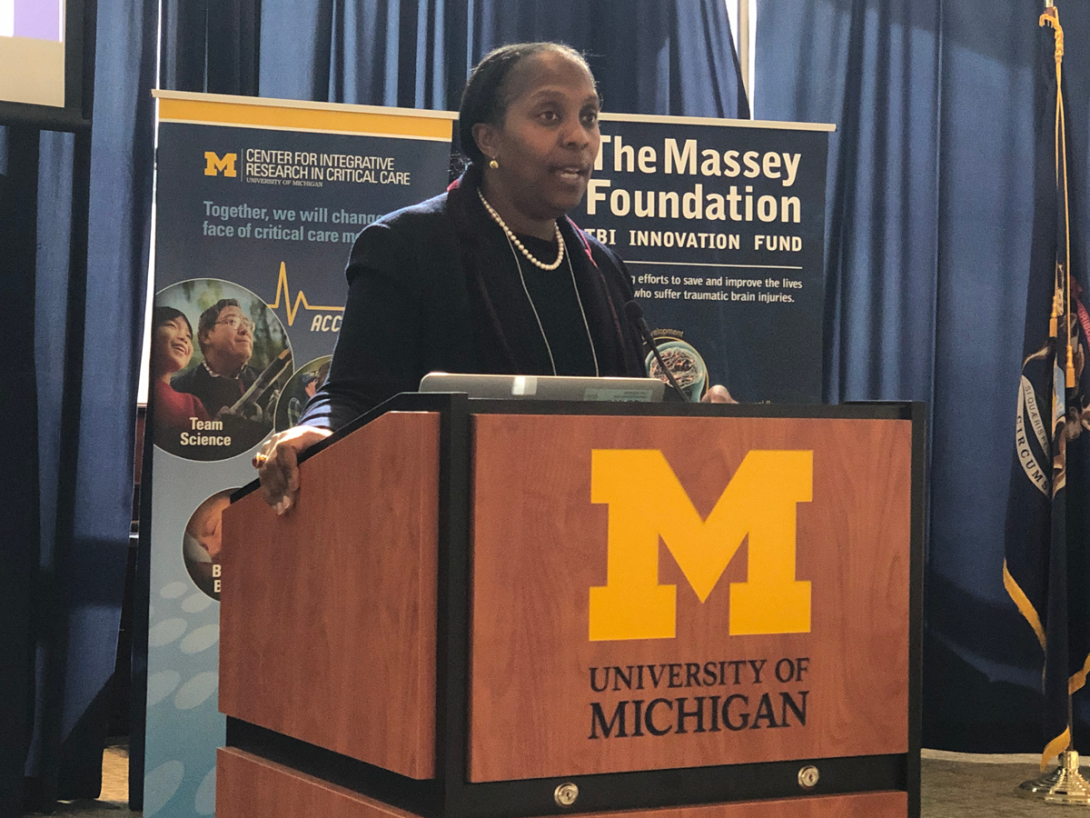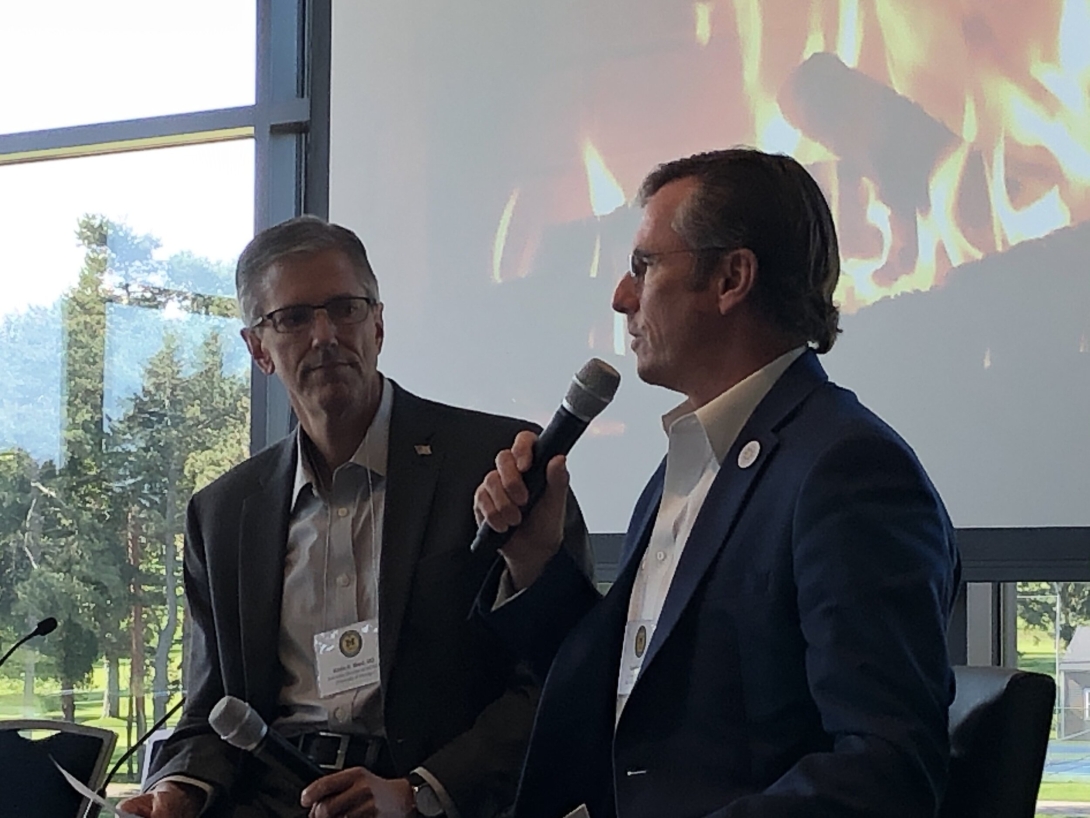
One gift, endless breakthroughs.
In 2015, the Weil Institute received a $7M investment from the Joyce and Don Massey Family Foundation—a catalyst that would spark a chain reaction of rapid-fire innovation across the field of traumatic brain injury (TBI).
Weil Research Teams Funded
University of Michigan Departments
Spin-off Companies Formed
Follow-on Funding Received
New Diagnostics & Devices
New Pioneering
Therapeutics
New Predictive Analytics Tools
Years Powered
by Weil

The stats seen above are just a sample of what Weil and its members have accomplished through the Massey TBI Grand Challenge, a powerful funding avenue for multidisciplinary critical care research teams. The Grand Challenge framework addresses the barriers between concept and realization by providing unique tools and resources to funded teams. The intensive process includes TBI education sessions, two rounds of detailed proposal submissions, and project reviews by TBI experts from across the nation including U-M, industry, and the Department of Defense.

Our partnership with the Foundation has enabled us to bring together experts from across the globe through our Massey TBI Regional Conference and Joyce Massey TBI Summit events.
The Massey Regional Conference aims to improve the outcomes of those who suffer severe traumatic brain injuries by sharing the latest in the field, and by supporting technology development and translational and clinical research that impacts the “golden hours” of care. It is a day full of insightful lectures, roundtable discussions with field and industry leaders, and presentations from funded Massey TBI Grand Challenge teams.
The Joyce Massey TBI Summit brings together TBI experts from across the country to present their current research, discuss the future of the field and identify important barriers to improving outcomes. Since the inaugural Summit, we have welcomed the nation’s leading authorities and those who are just beginning their journey—a combination that opens the door to new ideas and possibilities.
Partnering with the Department of Defense’s (DoD) Combat Casualty Care Research Program has provided our TBI research community with invaluable resources and opportunities for additional funding. DoD Neurotrauma leadership members form part of the Massey TBI Grand Challenge panel, assisting in reviewing proposals for funding, and providing mentoring to each of the funded teams.
- Cerebral Hematoma in Traumatic Brain Injury
- Trans-Ocular Bioimpedance: Seeing the Brain Through the Eyes (TOBI)
- Early Administration of Plasma and Valproic Acid
- Cerebral Hematoma in Traumatic Brain Injury
- Real-Time Hemodynamic Monitoring System
- Improving TBI-Induced Synaptic Changes
- Protecting Injured Brain Cells with Imatinib
- Digital External Ventricular Drain (DEVD) with Data Analytics Integration
- Quantitative Pupillometry for the Acute Detection and Prognosis of Traumatic Brain Injury
- Protecting Injured Brain Cells with Imatinib
- Using Advanced Genomic and Proteomic Technology to Ensure Valproic Acid's Success as an Early Treatment of Traumatic Brain Injury
- Automated Detection and Measurement of Subdural Hematoma Imaging Characteristics Following Traumatic Brain Injury
- Digital External Ventricular Drain (DEVD) with Data Analytics Integration
- Systolic Target Assessment Tool (STAT)
- Point-of-Care Microfluidic Platform for Detecting Traumatic Brain Injury (TBI)
- Barreleye: A Decision Support Tool for TBI Care
- Automated Extracranial Internal Carotid Artery Ultrasound Sensor
- Increased Neuroprotection Using Novel Drug Therapies
- Cerebrovascular blood volume assessment using brain bioimpedance
- Point-of-Care Microfluidic Platform for Detecting Traumatic Brain Injury (TBI)
- Intracranial Pressure Monitor Enhancement For Cerebral Hemodynamic Monitoring
- Diagnostic Tool For Coagulation Abnormalities In TBI
- Mitolux
- Mesenchymal Stem Cell-Derived Exosomes as a Neuroprotective and Neurorestorative Treatment Strategy for TBI
- Real-Time, Non-Invasive Brain Metabolism
- Neuroprotection with Intranasal Insulin after TBI
- TBI Companion
- Therapeutic Enhancement of Mitochondrial Function by Intranasal Mito-AntimiR in TBI
- Redox Point-of-Care Platform
- Regulatory Testing for LUCID-TTM: A Dual Therapeutic Device for Non-Invasive Mitochondrial Modulation & Targeted Temperature Management in TBI Patients
- A BBB Shuttle-Assisted Insulin Receptor Anti-Body for Neuroprotection in TBI
- The Michigan Algorithm for Acute Evaluation of TBI
- Evaluation of Immunomodulatory Device for Early Treatment of TBI
- Dose-Response Effect of of Intranasal Insulin Using Functional MRI
- Retinal Oximeter for Detection of Brain Tissue Hypoxia in TBI
- The Role of the Gut Microbiome in TBI
- Modeling the relationship between automatic optic nerve sheath diameter measurements from computed tomography scans and intracranial pressure in traumatic brain injury patients
- Glycemic variability following traumatic brain injury: utilizing a continuous glucose monitor in the golden hours to improve patient outcomes
- Development of an ultrasound-based flow-pressure index for the assessment of cerebral autoregulation
- Clinical development of LUCID: A therapeutic device for non-invasive mitochondrial modulation in adult TBI patients